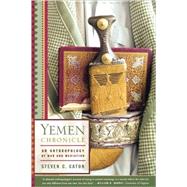Yemen Chronicle An Anthropology of War and Mediation
, by Caton, Steven C.- ISBN: 9780809098828 | 0809098822
- Cover: Paperback
- Copyright: 10/3/2006
In 1979, Steven C. Caton went to a remote area of Yemen to do fieldwork on the famous oral poetry of its tribes. The recent hostage crisis in Iran made life perilous for a young American in the Middle East; worse, he was soon embroiled in a dangerous local conflict and tribal hostilities simmered for months.YemenChronicleis his extraordinary report both on events that ensued and on the many theoreticallet alone practicaldifficulties of doing ethnography in such circumstances. Caton also offers a profound meditation on the political, cultural, and sexual components of modern Arab culture. Steven C. Caton, a professor of anthropology at Harvard University and director of its Center for Middle Eastern Studies, is the author ofLawrence of Arabia: A Film's Anthropology. He lives in Cambridge, Massachusetts, and New York City. In 1979, Steven C. Caton went to a remote area of Yemen to do fieldwork on the famous oral poetry of its tribes. The recent hostage crisis in Iran made life perilous for a young American in the Middle East; worse, he was soon embroiled in a dangerous local conflict.Yemen Chronicleis Caton's candid account of the extraordinary events that ensued. One day a neighboring sheikh came angrily to the sanctuary village where Caton lived, claiming that a man there had abducted his daughter and another girl. This was cause for war, and even though the culprit was captured and mediation efforts launched, tribal hostilities simmered for months. A man who was helping to resolve the dispute befriended Caton, showing him how the poems recited by the belligerents were connected to larger Arab conflicts and giving him refuge when the sanctuary was attacked. Then, unexpectedly, Caton himself was arrested and jailed for being an American spy. It was 2001 before Caton could return to Yemen to untangle the story of why he had been imprisoned and what had happened to the missing girls. Placing his contradictory experiences in their full context,Yemen Chronicleis not only an assessment of classical ethnographic procedures but also a meditation on the political, cultural, and sexual components of modern Arab culture. "[YemenChronicle] focuses on the themes of violence, honor, and hospitality in Arabic tribal society, and cultural misunderstandings and the efforts of a nonnative to be accepted in another culture . . . I highly recommend [Yemen Chronicle] to students of anthropology, Yemen, the Middle East, and anyone who has tried to live in a foreign culture."David M. Witty,The Journal of Military History "[YemenChronicle] focuses on the themes of violence, honor, and hospitality in Arabic tribal society, and cultural misunderstandings and the efforts of a nonnative to be accepted in another culture . . . The author captures the complexity of an outsider living in a traditional Arab society, where what is said is not always what is meant . . . [and] concludes with a short critique of the U.S. policy of regime change in the Middle East, conducted without consensus building or negotiation, a type of arrogance he equates with nineteenth-century imperialism . . . I highly recommend [Yemen Chronicle] to students of anthropology, Yemen, the Middle East, and anyone who has tried to live in a foreign culture."David M. Witty,The Journal of Military History "Yemen Chronicleis a wonderfully paradoxical book: an elegy shot through with comedy, a tale of a recent Arabian past that rings with echoes of theIliad. Caton modestly describes it as an 'ethno-memoir,' but it is more than that: it is a meditation on the very workings of memory, on the genesis of poetry and the nature of truth itself; it has resonances with a histor







